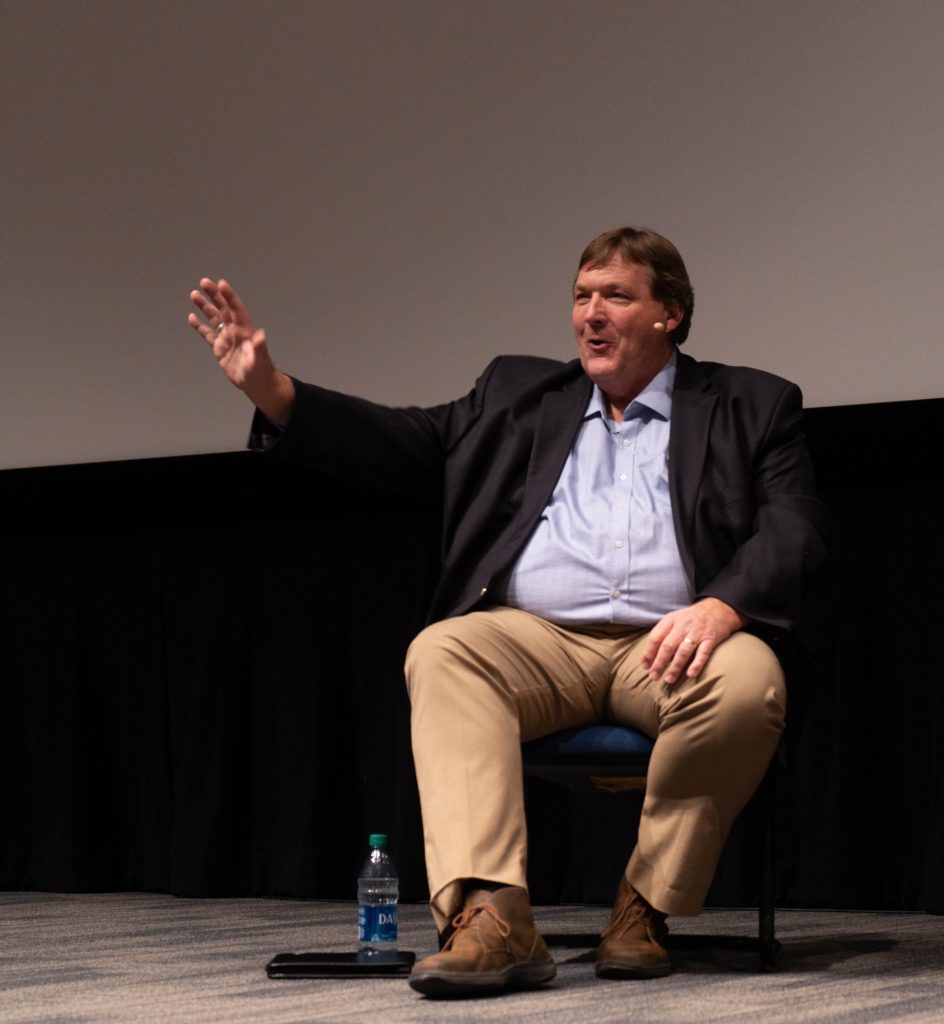
Hundreds of BYU students and faculty filled the JSB auditorium on Wednesday night for a panel on faith and sexuality that covered topics from LGBT self-acceptance to strategies for effective allyship.
The panel was put on by the Office of Student Success and Inclusion as a part of its outreach efforts to the LGBT community. Panelists included CAPS director Steve Smith, athletics administrator Liz Darger and Ben Schilaty, an Honor Code administrator and member of the LGBT community.
Moderator Blake Fisher asked the panelists a variety of questions, ranging from their individual experiences with the LGBT community to how students can reach out to their peers with love and respect.
Schilaty started the conversation by describing his unsuccessful experiences with dating as a gay undergraduate student at BYU. After relationships with both a female and male peers came to an end, he said he learned some difficult lessons.
“I’ve had to navigate wanting myself to change and wanting the Church to change so that I could be happy,” Schilaty said. “What I’ve learned is how to not wish that things could change, but how to live my best life with the circumstances that I’ve been given.”
He said he does this by maintaining close relationships with friends and family and by always trying to be in places where God can speak to him to direct his next steps.
Throughout the night, Schilaty shared numerous experiences of navigating the complex life of an openly gay man who is also an active member of The Church of Jesus Christ of Latter-day Saints.
“Sometimes I feel like I’m too gay for the Latter-day Saint community and too Latter-day Saint for the gay community,” he said. “But there have been some wonderful people who have made sure that I know I belong with them.”
Darger, who has worked extensively with the NCAA Common Ground initiative and other ally efforts, encouraged students to be true allies to their LGBT peers.
“I don’t get to have a list set aside of what allyship looks like,” she said. “Being an ally is about getting to know someone and asking them, ‘What can I do to help you?’”
Darger emphasized that as students try to “stand for truth and righteousness,” they need to honor others’ agency and focus on building positive, loving relationships rather than preaching or “pushing their beliefs” onto those with different ideas or lifestyles.
Smith focused his remarks on his experiences and conversations with LGBTQ students on campus and their struggles with mental health. He explained that the heightened prevalence of mental and emotional health struggles in the queer community is a result of “minority stress,” or feeling like one does not belong.
“Unfortunately, my dear friends, that happens at our church meetings and at our church gatherings,” Smith said. “That’s the place where you want to feel safest. That’s the place you want to feel you belong the most. When you hear it in those places, you come to the conclusion, ‘I don’t belong here either.’”

Smith discussed the importance of recognizing privilege in order to understand the perspectives of minority communities, including LGBT individuals. He also gave four suggestions for students who want to be better allies to the LGBT community or anyone with different lifestyles or beliefs: suspend assumptions, approach conversations with the intent to understand, listen and practice peace, meaning not responding in hostile or contentious ways to others’ personal thoughts and opinions.
The audience was intently engaged for the duration of the panel, including when they burst into applause after a candid statement from Schilaty.
“I look at my singlehood as a blessing and a strength because the body of Christ has many members,” Schilaty said, “And we can’t all be eyes or ears or hands or feet, and we can’t all be married people. And there are things a single, gay man can do that a married, straight man can’t. So I try to do those things.”
The panelists each offered closing thoughts of hope and encouragement to the members of the LGBT community in attendance who are still early in their journey.
“Hold tight to your values,” Schilaty said. “Any shame or self-hatred you feel, I think these are going to be temporary things. It gets so much better.”
The panel closed with a standing ovation from the entire auditorium.





